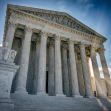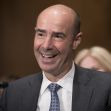On May 3, 2018, President Trump issued an executive order “to assist faith-based and other organizations in their efforts to strengthen the institutions of civil society and American families and communities.” The order continued:
Faith-based and community organizations have tremendous ability to serve individuals, families, and communities through means that are different from those of government…The executive branch wants faith-based and community organizations, to the fullest opportunity permitted by law, to compete on a level playing field for grants, contracts, programs, and other Federal funding opportunities.”
These good intentions were now to operate under the title of “White House Faith and Opportunity Initiative,” a partial reformulation of and expansion upon policies set in place by presidents Bush and Obama. Pursuant to the order, nine federal agencies –the Agency for International Development and the Departments of Agriculture, Education, Health and Human Services, Homeland Security, Housing and Urban Development, Justice, Labor and Veterans Affairs – submitted proposed rules to implement the executive order for comments in January. Over 95,000 comments were received. A summary of the comments in the final rule stated,
Several commenters, including Members of Congress, agreed with the proposed rules and said that they protect religious liberty for faith-based organizations, including as guaranteed by the First Amendment to the U.S. Constitution…Some commenters disagreed, however, arguing that no Federal funds should be given to faith-based organizations, including because such organizations are exempt from paying taxes. Some commenters argued that such faith-based organizations should be taxed.
With regard to the question of taxation, the general preamble to the final rule for all the agencies points out: “Contrary to some comments, the tax-exempt status of faith-based organizations does not preclude them from participating in Federal financial assistance programs and activities…The Agencies also note that these programs are open to tax-exempt secular organizations and…to faith-based organizations that pay taxes.”
The comments ran the expected gamut from support for a faith-based initiative to outright anti-clericalism, a reflection of the tensions within American society. The final rule sides largely with the former group:
The Agencies agree with the comments that said the proposed rules (and this final rule) protect the religious liberty of faith-based organizations. The First Amendment allows faith-based organizations to participate, and compete on equal footing with secular organizations, in neutral government funding programs.
On December 14, then-Attorney General William Barr issued a statement from the Department of Justice, announcing the publication of the final rule, and stating that “It removes requirements in prior regulations that placed unequal burdens on religious organizations, cast unwarranted suspicion on them, and were in tension with their religious liberty rights.”
DOJ’s section of the general rule begins with a clear statement of purpose:
A faith-based organization that applies for, or participates in, a social service program supported with Federal financial assistance may retain its independence and may continue to carry out its mission…provided that it does not use direct Federal financial assistance…to support or engage in any explicitly religious activities, including activities that involve overt religious content such as worship, religious instruction, or proselytization.
While some of the initiative’s detractors have labeled this “a solution in search of a problem,” the solution can well be seen as necessary given the amount of anti-clerical sentiment in the country. Although the initiative smacks a bit less of party politics than some other recent political developments, there are unquestionably those (on either side) who will perceive it as such.
With regard to DOJ grants, the language is straightforward, despite being embedded in a 381-page document:
Faith-based organizations are eligible, on the same basis as any other organization and considering any religious accommodations appropriate under the Constitution or other provisions of Federal law… to participate in any Department program for which they are otherwise eligible. Neither the Department nor any State or local government receiving funds under any Department program shall, in the selection of service providers, discriminate for or against an organization on the basis of the organization’s religious character or affiliation, or lack thereof, or on the basis of the organization’s religious exercise.
But the rule makes it clear that there is a limitation that takes into account both the Establishment Clause and the objections of the anti-clericalists in the government and country:
Organizations that receive direct Federal financial assistance from the Department may not engage in explicitly religious activities…If an organization conducts such explicitly religious activities, the activities must be offered separately, in time or location, from the programs or services funded with direct Federal financial assistance from the Department, and participation must be voluntary for beneficiaries of the programs or services funded with such assistance.
On the other hand, the new rule makes it clear that religion need not be purged completely:
Among other things, a faith-based organization that receives Federal financial assistance from the Department may use space in its facilities without concealing, altering, or removing religious art, icons, messages, scriptures, or symbols… and include religious references in its mission statements and other governing documents.
Although it may not survive the turnover in administrations, the new general rule for the time being codifies, clarifies and implements the current President’s 2018 executive order. “The freedom to exercise religious beliefs is a cornerstone of our Constitution and the federal government must uphold this right for all Americans,” said Barr. “This joint final rule is another in a long line of steps this Administration has taken to restore and protect religious liberty and ensure equal treatment for people of faith.”






